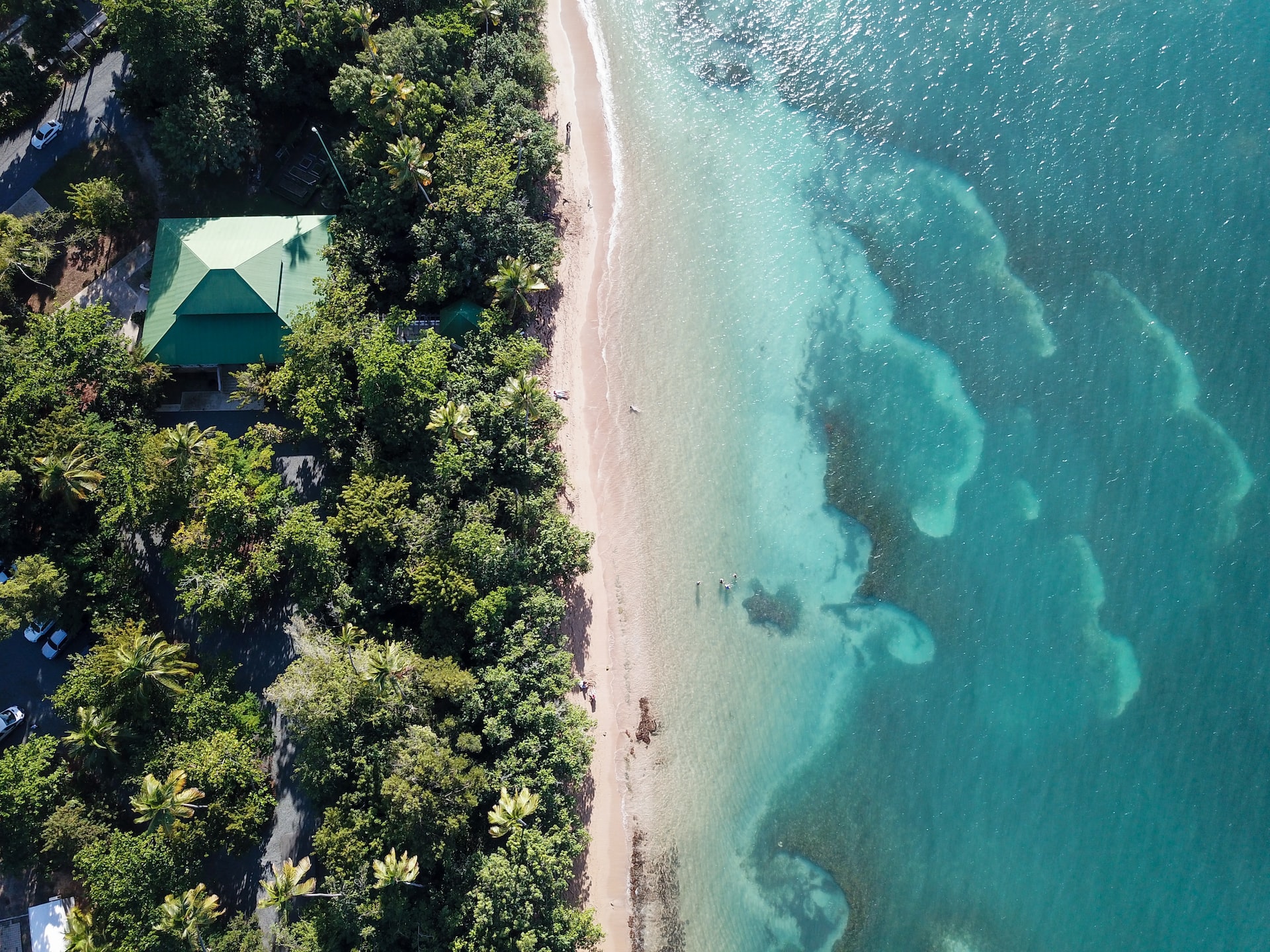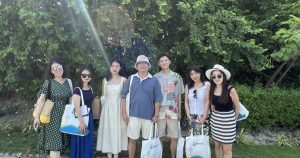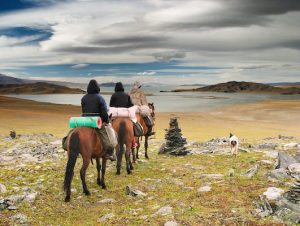
Heads up: some of the links on this site are affiliate links. If you click and make a booking or purchase, I’ll make a commission (at no extra cost to you). I partner with companies I personally use and the $$ goes towards creating more awesome, free travel content.
Since U.S.citizens aren’t required to travel with a passport to Puerto Rico, the island is a very popular vacation spot for Americans in need of sun, sea and sand.
Sitting between the Dominican Republic and the British Virgin Islands, Puerto Rico is the fourth largest Caribbean island by area and features a landscape of mountains, beaches and tropical rainforest.
So what is Puerto Rico known for? From mofongo and pina coladas to stunning beaches and bioluminescent bays, let’s dive into all the things that Puerto Rico is known for.
San Juan
Puerto Rico’s capital city of San Juan is famous for being the first European-established city in the Americas. Many visitors like to wander around the walled city, which is known for its colorful buildings, narrow streets and abundance of bars and restaurants.
The most popular attraction in Old San Juan is Castillo San Felipe del Morro (known as “el morro”) – a citadel that was built by the Spanish to protect the city from attacks. The citadel stands at the most northwesterly point of the old city and offers breathtaking views of the ocean.
El Yunque Rainforest
Covering an area of almost 29,000 acres, El Yunque rainforest is the only tropical rainforest in the U.S. National Forest System. In order to visit the rainforest visitors must book a timed reservation through www.recreation.gov, which can be done up to one month in advance.
The rainforest is home to numerous hiking trails, as well as natural pools, waterfalls and viewpoints. The Yokahú Observation Tower has an elevation of 1,575 feet and offers beautiful views of the ocean and the park’s lush green mountains. If you like birdwatching, you’ll have the opportunity to see birds such as woodpeckers, green mangos, and the Puerto Rican parrot.
Bioluminescent Bays
Puerto Rico is home to three bioluminescent bays where visitors can kayak and see plankton light up in the dark. Paddling or splashing a hand in the water causes them to light up, creating a glitter-like effect in the water.
In order to see this phenomenon, these single-celled organisms (called dinoflagellates) have to be found in very high concentrations. Mosquito Bay on the island of Vieques is the brightest one, since it has around 1,000,000 to 2,100,000 dinoflagellates per gallon of water, along with very low light pollution.
The most popular bioluminescent bay is Laguna Grande in Fajardo, since it’s the closest one to San Juan. Visitors kayak along a narrow canal before entering a large lagoon filled with glittering plankton.
The third bay in Puerto Rico is called La Parguera and can be found in the southwestern corner of the island. Here you can take a glass bottom boat ride and even swim in the water after dark.
Culebra
Located 20 miles off the east coast of Puerto Rico, Culebra is a stunning island with pristine beaches and a diverse landscape of dry forests, mangroves and seagrass beds. Its coral reefs and ecosystems are teeming with ocean life, including sea turtles, stingrays, remoras and other types of fish.
Culebra’s most famous beach is Flamenco Beach, which is famous for its rusty graffiti-covered tanks that were left over from the island’s naval base. The neighboring beaches of Tamarindo and Carlos Rosario are both part of Luis Peña Nature Reserve and are perfect for snorkeling and diving. To reach the island, visitors can either take a short 15-minute flight or catch the ferry from Ceiba on Puerto Rico’s east coast.
Beaches
Being an island, Puerto Rico has 270 miles of coastline and hundreds of sandy beaches to discover. The most beautiful beaches can be found on the Puerto Rican islands of Culebra and Isla de Vieques, which boast powdery white sands and turquoise blue waters.
Arguably the most beautiful beach in
Pina Colada
Puerto Rico is known for being the birthplace of the pina colada – a creamy cocktail containing rum, cream of coconut or coconut milk, and pineapple juice. The cocktail is usually served either blended or shaken with ice and is often served with a pineapple wedge and a maraschino cherry.
Exactly where the pina colada was invented is up for debate. The Caribe Hilton claims it was invented by their bartender Ramón “Monchito” Marrero, who worked at the hotel’s Beachcomber Bar and was asked to create a signature cocktail back in 1954.
However, Barrachina in Old San Juan claims that the pina colada was the creation of Ramón Portas Mignot, who first poured the cocktail in 1963. Outside the bar is a plaque that reads:
“The house where in 1963 the pina colada was created by Don Ramón Portas Mignot.”
Mofongo
One of Puerto Rico’s most famous foods is mofongo – a traditional dish made out of mashed plantains. The plantains are sliced and fried until tender, then mashed with garlic and crackling pork rinds (known as chicharrón). The mixture is usually served in a dome shape and often served with fried meat and chicken broth soup.
Tostones
Another popular food in Puerto Rico is Tostones – twice fried plantain slices that are served as a snack or side dish. To make tostones, the plantains are sliced into ovals and fried, then smashed and fried again.
Arroz Con Gandules
Puerto Rico’s national dish is Arroz con gandules, which consists of rice, pigeon peas and pork, cooked in sofrito (a blend of green peppers, onion, garlic, sweet Caribbean peppers). The dish is usually cooked in one pot, called a caldero, which is similar to a Dutch oven.
You’ll find arroz con gandules served at any type of gathering of family and friends, including birthdays, baby showers and holidays.
Golf
If you want to enjoy a round of golf in the sun, Puerto Rico offers an array of golf courses scattered across the north, east, south and west coasts. One of the best golf clubs on the island is TPC Dorado Beach, which is home to two beautiful 18-hole courses called East and Sugarcane.
Another popular golf course is Rio Mar Country Club, located in Río Grande, 40 minutes from San Juan. Designed by Tom and George Fazio, Rio Mar boasts a beautiful oceanfront setting, with views of El Yunque and the Atlantic Ocean.
Las Fiestas de la Calle San Sebastián
One of Puerto Rico’s most famous street festivals is Las Fiestas de la Calle San Sebastián, which takes place in Old San Juan, in honor of Saint Sebastian. It usually starts on the third Thursday of January and runs for four days till Sunday.
During the festival, hundreds of thousands of people gather in the streets of Old San Juan to dance, drink and enjoy the festivities. The festival features a parade of “Vejigantes” (Puerto Rican folkloric characters with colorful costumes), as well as various music and dance performances.
Surfing in Rincon
Located on the west of the island, Rincon is known for its consistent swells and is often referred to as the “surfing capital of the Caribbean”. It’s so popular for surfing that there’s even a statue of a surfer in the main town!
Rincon offers breaks suitable for surfers of all skill levels and there are numerous surf shops offering board rentals, including Surf Town Rincón, Mar Azul Surf Shop and Desecheo Surf Shop.
Surfing season in Rincon typically runs from December to April, so lots of U.S. travelers flock here looking to escape the winter snowstorms and enjoy some balmy weather.
Pork Highways
One of Puerto Rico’s gastronomic delicacies is lechón (spit roasted pork), which is typically served at Christmas but also tastes good at any time of year.
If you want to try some for yourself, check out Puerto Rico’s three “pork highways” – Naranjito, Trujillo Alto, and Cayey – which are lined with businesses serving lechon all year round.
El Morro
Perhaps the most famous landmark in Puerto Rico is El Morro – an impressive citadel that was constructed by the Spanish between 1539 and 1790. Perched on the edge of Isleta de San Juan overlooking the ocean, it was used to protect the city of San Juan from invasions by the British, Dutch and pirates.
In 1898, as a result of the Spanish-American War, it fell into the hands of the United States and was used as a military outpost during the First and Second World Wars. The US Army retired El Morro in 1961, handing it over to the National Park Service to turn it into a museum. Today it is a UNESCO World Heritage site and one of Puerto Rico’s most popular tourist attractions.
Bad Bunny & Ricky Martin
Wondering what famous people come from Puerto Rico? Rapper and Grammy award-winner Bad Bunny was born and raised in Vega Baja, which is around 30 miles west of San Juan. If you haven’t already heard of him – Bad Bunny is known for helping Spanish language music achieve mainstream popularity and has collaborated with famous artists such as Cardi B and Drake.
Another famous artist from Puerto Rico is Ricky Martin, who was born in 1971 in San Juan. Ricky is famous for hits such as Livin’ La Vida Loca and She Bangs.
Rum
Puerto Rico is known for producing rum and there are several distilleries spread across the island. The most popular distillery is the Casa BACARDÍ distillery, which is situated just across the bay from San Juan. The Bacardi distillery is the world’s largest producer of Bacardi rum and visitors have a choice of three tours –
A Final Word…
As you can see from the list above, Puerto Rico is known for lots of things, including bioluminescent bays, pina coladas, lush rainforest and beautiful beaches. If you want a tropical vacation without leaving the United States, then Puerto Rico is definitely the spot for you!
Many visitors choose to fly into San Juan and stick around the old town/Condado, but the island has so much more to offer than just its capital. Try to rent a car so you can explore some of the island’s best beaches and other places such as Rincon, Ponce and El Yunque.
For an awesome first time-trip, check out my suggested itinerary for 3 days in Puerto Rico, which covers the island’s northeast coast, including San Juan, El Yunque, Luquillo and Fajardo.



